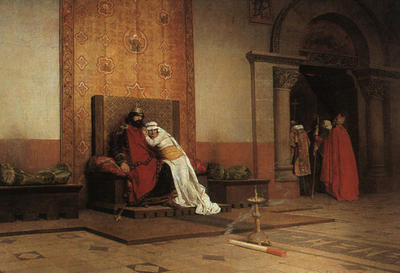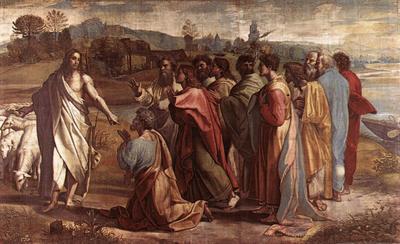4 From Mount Hor they set out by the way to the Red Sea, to go around the land of Edom; and the people became impatient on the way. 5 And the people spoke against God and against Moses, "Why have you brought us up out of Egypt to die in the wilderness? For there is no food and no water, and we loathe this worthless food." 6 Then the LORD sent fiery serpents among the people, and they bit the people, so that many people of Israel died. 7 And the people came to Moses, and said, "We have sinned, for we have spoken against the LORD and against you; pray to the LORD, that he take away the serpents from us." So Moses prayed for the people. 8 And the LORD said to Moses, "Make a fiery serpent, and set it on a pole; and every one who is bitten, when he sees it, shall live." 9 So Moses made a bronze serpent, and set it on a pole; and if a serpent bit any man, he would look at the bronze serpent and live.Numbers 21:4-9
14 And as Moses lifted up the serpent in the wilderness, so must the Son of man be lifted up, 15 that whoever believes in him may have eternal life." 16 For God so loved the world that he gave his only Son, that whoever believes in him should not perish but have eternal life.John 3:14-16
After the people’s miraculous exodus from bondage in Egypt, their joy to turned to bitterness in the wilderness.
 They complained against God and Moses and blasphemed God’s gift, the bread from heaven. They suffered snakebites in punishment for their sins. The snakebites caused great pain, in many cases followed by death. This great suffering brought many of them to acknowledge their sin to Moses and ask his intercessory prayer that the serpents be removed. Now, God certainly could have simply removed the serpents and healed the people on the basis of their interior repentance. Instead, He provided through Moses a peculiar ritual, in which those who participated could “live”.
They complained against God and Moses and blasphemed God’s gift, the bread from heaven. They suffered snakebites in punishment for their sins. The snakebites caused great pain, in many cases followed by death. This great suffering brought many of them to acknowledge their sin to Moses and ask his intercessory prayer that the serpents be removed. Now, God certainly could have simply removed the serpents and healed the people on the basis of their interior repentance. Instead, He provided through Moses a peculiar ritual, in which those who participated could “live”.What can we say about this ritual?
- It required a specific action on the part of the minister: Moses had to place a “fiery serpent” on a pole and make it accessible to the people.
- The ritual bore a divine promise: God said that “every one who is bitten” would survive upon seeing the serpent.
- It required a specific action on the part of the one desiring healing: he must look upon the serpent. In this, each person hoping to be healed needed to acknowledge his sins by gazing upon the representation of the consequence of their sins, the wages of which is death.
- It was effective. The passage specifically tells us that people indeed were saved from death by obediently performing the outward action demanded by the rite.
- It did not require perfect interior repentance. The outward action perhaps depended on at least some sort of repentance, but the 'bar' was set low, so to speak.
- The snakes themselves, as well as the painful bites they caused, were not taken away. The people still had to suffer from painful but temporary consequences of their sins. Yet God, through the ritual, cancelled the fatal outcome of their punishment.
- Healing was on God's terms, not the people's. They wanted their suffering taken away. Instead, God gave them life. They wanted their wishes granted simply by their request to Moses. Instead, God required a specific action that would require and manifest obedience on the part of the sinner.
Jesus, in the Gospel of John, relates this reality to Himself. In fact, the incident in the desert foreshadows the crucifixion of our Savior. The serpents were not sin, but they were sent by God because of sin, and to chastise, and to urge sinners to repentance. Jesus was not sin, but He was sent by His Father because of sin, and to call sinners to repentance. The serpents and their icon on the pole together brought conviction of sin and a means of rescue from its fatal consequence: natural death. The crucified Lord brought knowledge of sin and a means of rescue from its eternal spiritual consequence: eternal death.
21 For our sake he made him to be sin who knew no sin, so that in him we might become the righteousness of God.2 Corinthians 5:21
- Who was healed… everyone who repented, or everyone who looked at the serpent?
–Those who looked at the serpent. - Did anyone survive who did not look at the serpent?
-We aren’t told.
The serpent on the pole prefigures the sacraments of the New Covenant, particularly Baptism. In Baptism, God has prescribed a simple ritual which He requires man to perform in order to obtain a supernatural promise: forgiveness of sins and a share in the very life of God.
38 And Peter said to them, "Repent, and be baptized every one of you in the name of Jesus Christ for the forgiveness of your sins; and you shall receive the gift of the Holy Spirit. 39 For the promise is to you and to your children and to all that are far off, every one whom the Lord our God calls to him."Acts 2:38-39
Again God 'sets the bar low' in order to make His grace and salvation accessible to everyone, including us many who have difficulty repenting perfectly of our sins. God helps us to understand just how unmerited His forgiveness is, by attaching it as a divine promise to the simple human act of washing, but washing that is always received, never done for oneself. People desiring Baptism do not and can not baptize themselves.
The outward act of Baptism is so simple, so commonplace... yet so illustrative of the great supernatural reality taking place: the Spirit hovers over the water; water flows from the side of the Savior;
 God says "Let there be Light"... and the Light of Christ dawns upon the first day of a new creation more glorious than God's creation of the universe. All we need do is cooperate to the extent that God's grace has enabled our feeble will. If all we can do is set our eyes upon the cross, if all that time permits is the brief expression of faith of the thief on a cross, then God can save. But let us not put ourselves and our children in the category of those Israelites who did not gaze upon the serpent on the pole either out of pride, negligence, or disbelief. We can not safely presume they were saved.
God says "Let there be Light"... and the Light of Christ dawns upon the first day of a new creation more glorious than God's creation of the universe. All we need do is cooperate to the extent that God's grace has enabled our feeble will. If all we can do is set our eyes upon the cross, if all that time permits is the brief expression of faith of the thief on a cross, then God can save. But let us not put ourselves and our children in the category of those Israelites who did not gaze upon the serpent on the pole either out of pride, negligence, or disbelief. We can not safely presume they were saved.The Bible plan -God's plan- is for us to preach and follow the sure and level path that God has provided, which begins with Baptism to ignite the lamp of our soul and set our course toward heaven. In this washing we are assured to receive the promise of eternal life through the waters of Baptism, to gaze upon our Savior through the lifegiving water flowing from His side:
he saved us, not because of deeds done by us in righteousness, but in virtue of his own mercy, by the washing of regeneration and renewal in the Holy Spirit...Titus 3:5
17 The Spirit and the Bride say, "Come." And let him who hears say, "Come." And let him who is thirsty come, let him who desires take the water of life without price.Revelation 22:17






